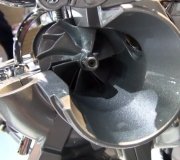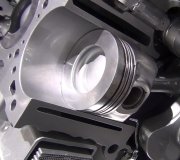Nope. If that's true, they could be correct, but that housing is normally attached by the engine builder, not the person installing the engine. You typically wouldn't need sealant on that gasket, but even if you did put some there, that stuff skins over in about 20 minutes. If your mechanic bolted that housing on with sealant before installing the engine into the car, it would have had hours to set up, and it's not going to break off and plug anything after that. Even if I could see those bearings myself, it would likely be almost impossible to say who to believe. If there was sealant in the holes in the crankshaft that feed the oil to the bearings, then it would likely be the mechanic's fault. Rebuilders don't run the engine so even if they used the sealant, it would be cured by the time they shipped the engine to you. It's not going to go anywhere after that.
It's also possible WAY too much sealant was used. Some inexperienced mechanics glop everything full in hopes it will squish into places they might otherwise overlook. That could easily plug a passage to or from the oil filter, but then there wouldn't be any pressure at the sending unit and your warning light would have been on.
Either way, it's hard to imagine how the bearings could have lasted for 500 miles without oil. The crank doesn't sit in the oil. In fact, that would cause more problems. The oil sits low enough in the pan to be kept away from the spinning crankshaft and its counterweights. Many engines even use a "windage tray" just under the crankshaft. That is to prevent the wind from the spinning crankshaft from whipping up the oil and aerating it. Air bubbles in the oil compress and reduce its ability to isolate moving parts from each other, namely the crankshaft and connecting rod bearings.
I don't know about your specific engine, but most engines send oil to the camshaft bearings through the crankshaft bearings, so if the passages were blocked enough to destroy the main, (crankshaft) bearings, the connecting rod and camshaft bearings should show similar wear. Hydraulic lifters, when used, typically sit in their own oil passages that aren't fed from the main bearings so they would pump up normally. If they were noisy, that would indicate the oil passage was blocked closer to the filter.
If this engine came from a high-volume rebuilder, they have everything down to a science and they know what to do to avoid problems. For that reason, I'm inclined to agree that the mechanic's use of gasket sealer caused the problem. Still, you have no way of knowing if something got overlooked when they built the engine.
I have an engine that was rebuilt by my students a few years ago. It failed after 40 miles. New crankshaft and bearings and it's been fine for over 600 miles. We never did find the cause of the original failure.
Tuesday, January 31st, 2012 AT 6:39 AM



